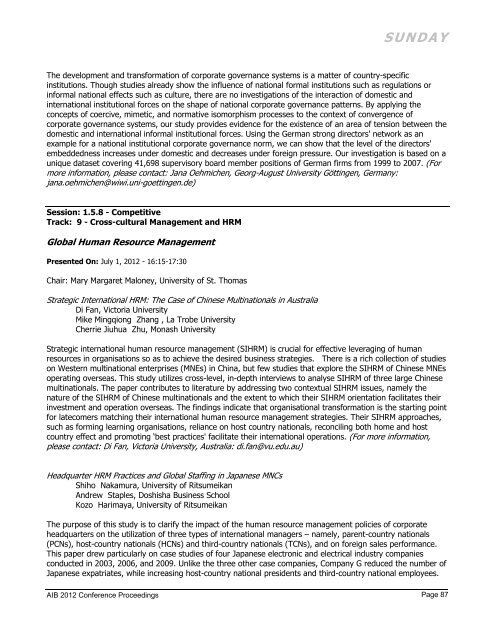AIB 2012 Conference Proceedings - Academy of International ...
AIB 2012 Conference Proceedings - Academy of International ...
AIB 2012 Conference Proceedings - Academy of International ...
You also want an ePaper? Increase the reach of your titles
YUMPU automatically turns print PDFs into web optimized ePapers that Google loves.
SUNDAY<br />
The development and transformation <strong>of</strong> corporate governance systems is a matter <strong>of</strong> country-specific<br />
institutions. Though studies already show the influence <strong>of</strong> national formal institutions such as regulations or<br />
informal national effects such as culture, there are no investigations <strong>of</strong> the interaction <strong>of</strong> domestic and<br />
international institutional forces on the shape <strong>of</strong> national corporate governance patterns. By applying the<br />
concepts <strong>of</strong> coercive, mimetic, and normative isomorphism processes to the context <strong>of</strong> convergence <strong>of</strong><br />
corporate governance systems, our study provides evidence for the existence <strong>of</strong> an area <strong>of</strong> tension between the<br />
domestic and international informal institutional forces. Using the German strong directors' network as an<br />
example for a national institutional corporate governance norm, we can show that the level <strong>of</strong> the directors'<br />
embeddedness increases under domestic and decreases under foreign pressure. Our investigation is based on a<br />
unique dataset covering 41,698 supervisory board member positions <strong>of</strong> German firms from 1999 to 2007. (For<br />
more information, please contact: Jana Oehmichen, Georg-August University Göttingen, Germany:<br />
jana.oehmichen@wiwi.uni-goettingen.de)<br />
Session: 1.5.8 - Competitive<br />
Track: 9 - Cross-cultural Management and HRM<br />
Global Human Resource Management<br />
Presented On: July 1, <strong>2012</strong> - 16:15-17:30<br />
Chair: Mary Margaret Maloney, University <strong>of</strong> St. Thomas<br />
Strategic <strong>International</strong> HRM: The Case <strong>of</strong> Chinese Multinationals in Australia<br />
Di Fan, Victoria University<br />
Mike Mingqiong Zhang , La Trobe University<br />
Cherrie Jiuhua Zhu, Monash University<br />
Strategic international human resource management (SIHRM) is crucial for effective leveraging <strong>of</strong> human<br />
resources in organisations so as to achieve the desired business strategies. There is a rich collection <strong>of</strong> studies<br />
on Western multinational enterprises (MNEs) in China, but few studies that explore the SIHRM <strong>of</strong> Chinese MNEs<br />
operating overseas. This study utilizes cross-level, in-depth interviews to analyse SIHRM <strong>of</strong> three large Chinese<br />
multinationals. The paper contributes to literature by addressing two contextual SIHRM issues, namely the<br />
nature <strong>of</strong> the SIHRM <strong>of</strong> Chinese multinationals and the extent to which their SIHRM orientation facilitates their<br />
investment and operation overseas. The findings indicate that organisational transformation is the starting point<br />
for latecomers matching their international human resource management strategies. Their SIHRM approaches,<br />
such as forming learning organisations, reliance on host country nationals, reconciling both home and host<br />
country effect and promoting ‘best practices' facilitate their international operations. (For more information,<br />
please contact: Di Fan, Victoria University, Australia: di.fan@vu.edu.au)<br />
Headquarter HRM Practices and Global Staffing in Japanese MNCs<br />
Shiho Nakamura, University <strong>of</strong> Ritsumeikan<br />
Andrew Staples, Doshisha Business School<br />
Kozo Harimaya, University <strong>of</strong> Ritsumeikan<br />
The purpose <strong>of</strong> this study is to clarify the impact <strong>of</strong> the human resource management policies <strong>of</strong> corporate<br />
headquarters on the utilization <strong>of</strong> three types <strong>of</strong> international managers – namely, parent-country nationals<br />
(PCNs), host-country nationals (HCNs) and third-country nationals (TCNs), and on foreign sales performance.<br />
This paper drew particularly on case studies <strong>of</strong> four Japanese electronic and electrical industry companies<br />
conducted in 2003, 2006, and 2009. Unlike the three other case companies, Company G reduced the number <strong>of</strong><br />
Japanese expatriates, while increasing host-country national presidents and third-country national employees.<br />
<strong>AIB</strong> <strong>2012</strong> <strong>Conference</strong> <strong>Proceedings</strong><br />
Page 87

















